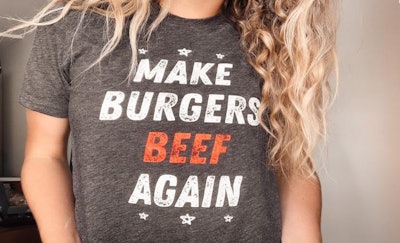
While recently wearing a new T-shirt that says, "Make Burgers Beef Again," I was reminded how important it is to understand what a meaningful elevator speech consists of.
While in line to check out at Target the lady in front of me asked me what the meaning behind my shirt was? I quickly explained that as a fourth-generation cattle producer my family has spent decades providing consumers with a product, that not only we eat, but we take pride in offering to other families and those plant-based proteins that claim to be like meat, are far higher in sodium and offer less protein value than traditional products. Not to mention they are composed of multiple ingredients rather than just one. I told her that in some states, the law prohibits misleading meat labels for cell-cultured or plant-based products that do not contain any real meat.
The lady, with her three kids in the cart, smiled softly and explained that she has been thinking about trying plant-based alternatives to offer her kids a healthier option that is also free of antibiotics.
I smiled, in my mind I thought perfect, she just opened the door for another conversation.
I told her that I too am a mother and that I understand wanting to provide her kids with the best nutritional option. However, I explained that I hoped she would not fear antibiotics in any meat, be it beef, chicken or pork, due to the withdrawal dates the FDA (Food and Drug Administration) has in place.
Soon it was her turn to check out and she went on her way.
Why properly phrasing what you say matters
For farmers and ranchers to gain a better reputation with consumers, they need to do a better job of gaining their trust by using values to drive purchasing choices, explained Leah Dorman, director of food integrity and consumer engagement at Phibro Animal Health.
Dorman spoke April 16, 2019, at the "Values First – The Building Block that Connects with Consumers" workshop, held during the Egg Industry Center Forum in Kansas City, Missouri.
While some consumers are often turned off by science-based facts alone, using values consumers can relate to in order to gain their trust may help get your point across without belittling their opinions.
What your elevator speech should contain
Elevator speeches often allow a person to explain what and why they are passionate about something. A good elevator speech should be understanding of attitudes, build trust between you and the person and explain what your own story is, Dorman said at the 2019 event.
Like with any good communication practices, it is also important that farmers and/or ranchers listen to understand rather than listen to respond. When producers hear why consumers have made a certain buying decision, it is important to understand why then again share why producers do what they do.
Dorman explained that shared values are three to five times more powerful in building trust than sharing facts or demonstrating technical expertise.
Dorman referenced a quote from President Theodore Roosevelt that said, "No one cares how much you know until they know how much you care." She referred to this quote as an example of how agriculture professionals should reach those making purchasing decisions.
After thinking back to this presentation from over a year ago, I am glad I remembered the context of what Dorman said. I left the store the other day hoping that sharing my generations' worth of family values and livestock background with her would leave a positive perspective on meat production in her mind. I also thought to myself that maybe I need to buy more of these conversation-starting t-shirts just for fun.

















